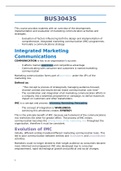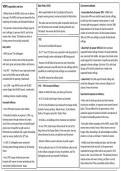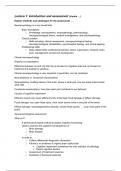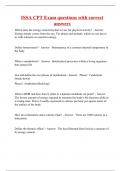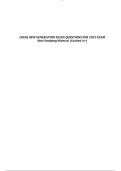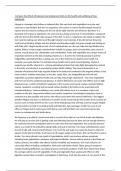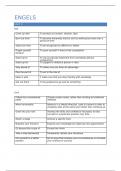H3 De Sovjet-Unie
3.2 De Russische Revolutie
Rusland vóór 1917
Rusland voor 1917
Vanaf 1613: keizerrijk --> tsaar
Romanov dynastie (macht van God)
Nicolaas II (1868-1918)
Autocratie = zelfbestuurder
Absolutisme
Rusland 19e eeuw
Landbouwmaatschappij
Adellijke grootgrondbezitters
--> feodalisme (afhankelijkheid heer en knecht)
Nb. Adel --> geen voordeel bij modernisering landbouw
Eind 19e eeuw
Opkomst Russische industrie
Sociale kwestie
--> Slechte woon en werkomstandigheden
Onvrede tsaar
Kritiek op autocratie (zelfbestuurder)
A. Liberale burgers --> grondrechten en inspraak (voor rijke burgers)
B. Marxisten --> kapitalisme = ongelijkheid/uitbuiting
--> opstand arbeidersklasse (klassenstrijd) -->
Revolutie --> communistische staat (arbeiders aan de macht (over het land en de
productiemiddelen))
Lenin
1887: broer veroordeeld ter dood --> Lenin radicaliseert
Communisme
1891: jurist
1897-1900: Siberië
1905: Revolutie
Marxism-Leninism
Probleem Marxisme: weinig arbeiders in Rusland
Lenin past de leer aan Rusland aan
Revolutie in Rusland door strak georganiseerde partij
Leden beroepsrevolutionairen
, Bolsjewieken (de minderheid)
Nb. Sociaaldemocraten --> eens met Marx én voor algemeen kiesrecht = mensjewieken
Nb. Geheime politie
Russisch-Japanse oorlog
1904-1905
Japan --> expansie in Korea en China (Mantsjoerije)
Rusland reageert (Port Arthur)
1905: Zeeslag Tsushima --> Russische vloot vernietigt
Rusland verliest de oorlog --> onrust in Rusland
--> hierdoor twijfelen aan tsaar
1905
Demonstratie Winterpaleis --> hervormingen/kiesrecht
Politie opent vuur
Toch: Doema (parlement, weinig invloed)
St. Petersburg: arbeiders richten een sovjet (raad) op
Twee revoluties in één jaar
Twee revoluties in een jaar
1914: WOI --> strijd verloopt dramatisch voor Rusland
Slachtoffers
Slechte uitrusting leger
Hoge voedselprijzen
Honger en plundering
Tsaar: dramatisch legeraanvoerder
Feb 1917: revolutionaire sfeer in Rusland
Februarirevolutie 1917
Februari --> Doema steunt demonstranten
2 maart --> Nicolaas II treedt af
VR (voorlopige regering): Liberalen en sociaaldemocraten
--> Revolutie door verandering op politiek gebied
Taken:
1. Grondwet
2. Verkiezingen
3. Oorlog beëindigen
Lenin in St. Petersburg
Duitsland --> smokkelt Lenin Rusland binnen
Waarom?
Aprilstellingen:
3.2 De Russische Revolutie
Rusland vóór 1917
Rusland voor 1917
Vanaf 1613: keizerrijk --> tsaar
Romanov dynastie (macht van God)
Nicolaas II (1868-1918)
Autocratie = zelfbestuurder
Absolutisme
Rusland 19e eeuw
Landbouwmaatschappij
Adellijke grootgrondbezitters
--> feodalisme (afhankelijkheid heer en knecht)
Nb. Adel --> geen voordeel bij modernisering landbouw
Eind 19e eeuw
Opkomst Russische industrie
Sociale kwestie
--> Slechte woon en werkomstandigheden
Onvrede tsaar
Kritiek op autocratie (zelfbestuurder)
A. Liberale burgers --> grondrechten en inspraak (voor rijke burgers)
B. Marxisten --> kapitalisme = ongelijkheid/uitbuiting
--> opstand arbeidersklasse (klassenstrijd) -->
Revolutie --> communistische staat (arbeiders aan de macht (over het land en de
productiemiddelen))
Lenin
1887: broer veroordeeld ter dood --> Lenin radicaliseert
Communisme
1891: jurist
1897-1900: Siberië
1905: Revolutie
Marxism-Leninism
Probleem Marxisme: weinig arbeiders in Rusland
Lenin past de leer aan Rusland aan
Revolutie in Rusland door strak georganiseerde partij
Leden beroepsrevolutionairen
, Bolsjewieken (de minderheid)
Nb. Sociaaldemocraten --> eens met Marx én voor algemeen kiesrecht = mensjewieken
Nb. Geheime politie
Russisch-Japanse oorlog
1904-1905
Japan --> expansie in Korea en China (Mantsjoerije)
Rusland reageert (Port Arthur)
1905: Zeeslag Tsushima --> Russische vloot vernietigt
Rusland verliest de oorlog --> onrust in Rusland
--> hierdoor twijfelen aan tsaar
1905
Demonstratie Winterpaleis --> hervormingen/kiesrecht
Politie opent vuur
Toch: Doema (parlement, weinig invloed)
St. Petersburg: arbeiders richten een sovjet (raad) op
Twee revoluties in één jaar
Twee revoluties in een jaar
1914: WOI --> strijd verloopt dramatisch voor Rusland
Slachtoffers
Slechte uitrusting leger
Hoge voedselprijzen
Honger en plundering
Tsaar: dramatisch legeraanvoerder
Feb 1917: revolutionaire sfeer in Rusland
Februarirevolutie 1917
Februari --> Doema steunt demonstranten
2 maart --> Nicolaas II treedt af
VR (voorlopige regering): Liberalen en sociaaldemocraten
--> Revolutie door verandering op politiek gebied
Taken:
1. Grondwet
2. Verkiezingen
3. Oorlog beëindigen
Lenin in St. Petersburg
Duitsland --> smokkelt Lenin Rusland binnen
Waarom?
Aprilstellingen:



